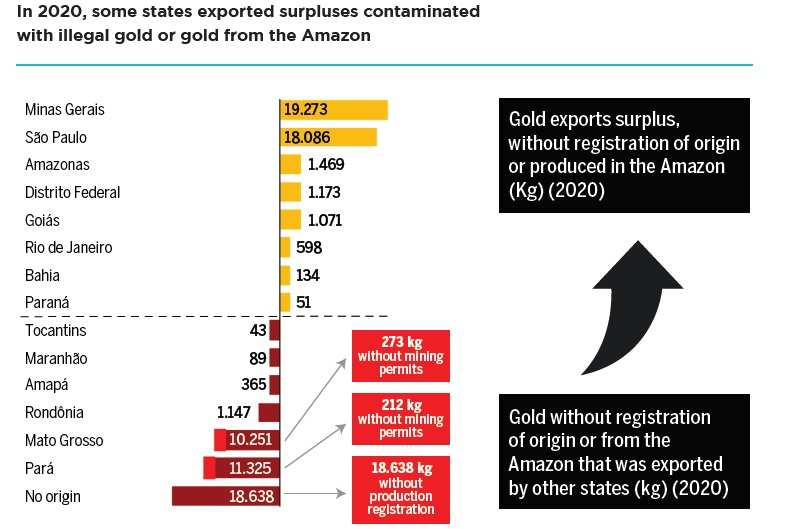Gold Smuggling Constitutes 17% of Brazil’s Total Exports — Report
Brazil Exported 19 Tons Gold By Illegal Smuggling in 2020

According to a new research by Instituto Escolhas, Brazil shipped 111 tonnes of gold worth $ 4.9 billion last year, primarily to Canada, Switzerland, Poland, the United Kingdom, the United Arab Emirates, Italy, and India – and 19 tonnes, or 17% of that gold, was unlawfully mined.
According to the research, Southeastern states like as Minas Gerais and So Paulo were the leading exporters of gold that lacked registration or licenses.
“Countries should insist that Brazil create procedures to restrict these exports and stop supporting the destruction of the Amazon rainforest,” Instituto Escolhas product manager Larissa Rodrigues said.
According to a survey published last year by the charity Amazon Geo-Referenced Socio-Environmental Information Network, the Amazon contains over 4,470 illicit mining sites, with more than half of them in Brazil.

The Yanomami, South America’s biggest group of Indigenous peoples who still live in relative isolation, are likewise threatened by illegal gold and diamond mining.
According to satellite photos, illegal miners deforested an area the size of 500 soccer fields in Yanomami land last year, marking a 30 percent increase in the territory’s deforestation.
The states of Minas Gerais, So Paulo, Amazonas, and Goiás, as well as the area around Braslia, were the primary sources of illegal gold.
However, according to the NGO, “these states either did not produce a single gramme of gold or exported considerably more than their [total gold] output, which implies they are exporting unregistered gold or gold mined in other states.”
Canada, Switzerland, Poland, the United Kingdom, the United Arab Emirates, Italy, and India are the most popular destinations. According to Instituto Escolhas, these countries should put pressure on the Brazilian government to implement gold traceability.
Illegal gold mining is part of a larger argument about whether mining should be allowed on indigenous property. According to the government, unlocking protected areas will aid in the regularisation and supervision of environmental consequences.
“Roraima, for example, is now experiencing a surge in illegal gold mining. They show that there is a lot of gold being exploited in Roraima, which is prohibited, but this gold is sold in Colombia to avoid inspection and seizure in Brazil, according to meetings I’ve had with people from the region “In a recent interview with BNamericas, the chair of the lower house mining and energy committee, Édio Lopes, said.
